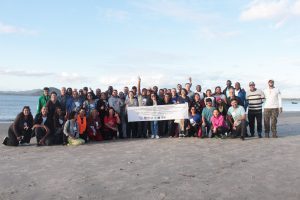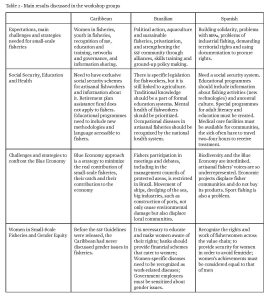The Latin American and Caribbean Workshop on IYAFA 2022 issued a global Call for Action for sustainable and equitable small-scale fisheries
This article is by Beatriz Mesquita Pedrosa Ferreira (mesquitabia@hotmail.com), Leopoldo Cavaleri Gerhardinger (leocavaleri@gmail.com), Vivienne Solis Rivera (vivienne.solis.rivera@gmail.com), Henrique Callori Kefalas (henriquekefalas@linhadagua.org.br) and Katia Regina Aroucha Barros (krabarros@gmail.com)
A tourist village in Cananeia city in the south coast of the Sao Paulo state in Brazil hosted 45 fishermen, fisherwomen and supporters from 16 different countries on 2-5 November in 2022. They had gathered for a workshop on Latin America and the Caribbean, titled: IYAFA 2022 – Celebrating Sustainable and Equitable Small-Scale Fisheries. The organizing committee comprised the International Collective in Support of Fishworkers (ICSF), Comissao Nacional de Fortalecimento das Reservas Extrativistas (CONFREM), Instituto Linha D’Água (LDA) and Associacao de Moradores Itacuruca Pereirinha (AMOIP).
The workshop’s main objective was to deepen fishworker organizations’ knowledge and analysis of food security and tenure rights so as to strengthen their capacities to engage with these issues internationally. Another objective was to empower the local community of fishers to receive big groups and interact with them.
The participatory methodology was invoked at the workshop, with prior activities such as self-introductions with the aid of cultural artefacts and visual representations of fisheries-related activities. All the event sessions focused on active and collective participation.
The workshop’s main objective was to deepen fishworker organizations’ knowledge and analysis of food security and tenure rights so as to strengthen their capacities to engage with these issues internationally
The workshop was organized into six sessions. The first was a group presentation, in which countries were divided into gatherings by language. The second session discussed issues related to social security, education and health. While other sessions deliberated on the Blue Economy and gender, the fifth session featured regional leaders discussing the creation of a platform for working together, namely the Latin America Union of Artisanal Fishers or ULAPA. The last session discussed and approved the final statement of the workshop. The meeting also organized a field trip that exposed participants to the traditional fishing methods used in the area.
In parallel to the workshop, and as an alternative model of media and information literacy (‘edu-communication’), youth communicators of the fisher organizations had the opportunity to join a practical course on collaborative audiovisual coverage (CAC) that generated a video about the workshop. This was shown at the end of the event to all participants. Local professional artists also employed graphic techniques to report the week’s activities.

These methods complemented the production and translation of the final report, which was prepared by Ligia M. Rocha, Sivaja K Nair and Janani Ganesan of ICSF. It was designed to make the discussions from the workshop accessible to all.
Communications for the 21st century
The CAC training consisted of three skill development modules. The first dealt with research, script writing and planning for audio-visual production. The second elaborated on production, direction and recording, and discussed the technical knowledge required to execute the skills developed in the first module. The third focused on the creation of the final product: the editing and publishing processes to get the video ready for broadcast.
In the graphic facilitation work, the ideas and information discussed in the workshop were transformed into visual imagery to help systematize content for ease of understanding. The facilitators guided the creation of two real-time narrative panels throughout the workshop, capturing the essence of the discussions visually in real time.
The focus of the workshop on the risks and opportunities of the Blue Economy agenda in the region was based on a critical dialogue about the results of ICSF’s study titled ‘Baffling Shades of Blue: Addressing the Impacts of the Blue Economy on Small-Scale Fisheries in Latin America’.
The fundamental rights of fishers include the right to land, social development and decent work, along with women’s rights, a transversal theme of the workshop. The main topics discussed at the workshop are summarized in Table 1.
 Two final documents were agreed on by all the participants: the Gender Equity Action Plan for Small-Scale Fisheries in Latin America and the Caribbean; and the Cananeia Statement. A global Call for Action was discussed by the participants, which includes five areas of immediate concern for artisanal fishworkers. They are:
Two final documents were agreed on by all the participants: the Gender Equity Action Plan for Small-Scale Fisheries in Latin America and the Caribbean; and the Cananeia Statement. A global Call for Action was discussed by the participants, which includes five areas of immediate concern for artisanal fishworkers. They are:
The presenters at the workshop also strongly recommended that the SSF Guidelines be effectively implemented in all Latin American and Caribbean countries through dissemination in all languages.
For more
Report on Latin American and Caribbean Workshop – IYAFA 2022: Celebrating Sustainable and Equitable Small-scale Fisheries, 2-5 November 2022, Brazil Report
https://icsf.net/wp-content/uploads/2023/03/930.ICSF231_LAC_Report.pdf
Latin America and the Caribbean Workshop: IYAFA 2022-Celebrating Sustainable and Equitable Small-scale Fisheries, Brazil, 2-5 November 2022
https://icsf.net/resources/latin-america-workshop-iyafa-2022/
ICSF
https://icsf.net/